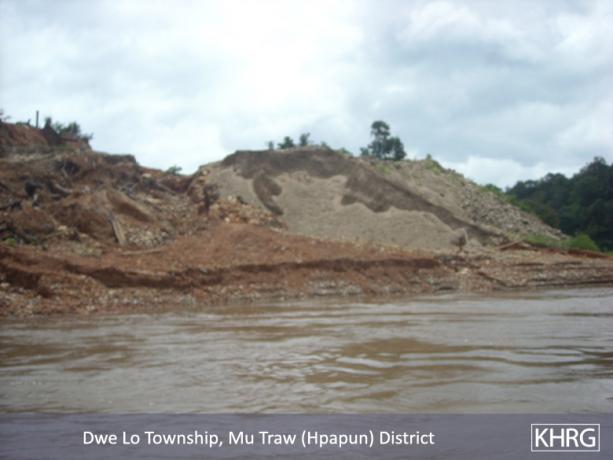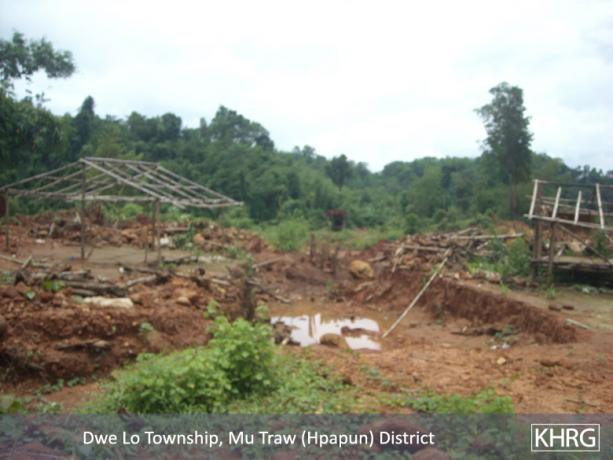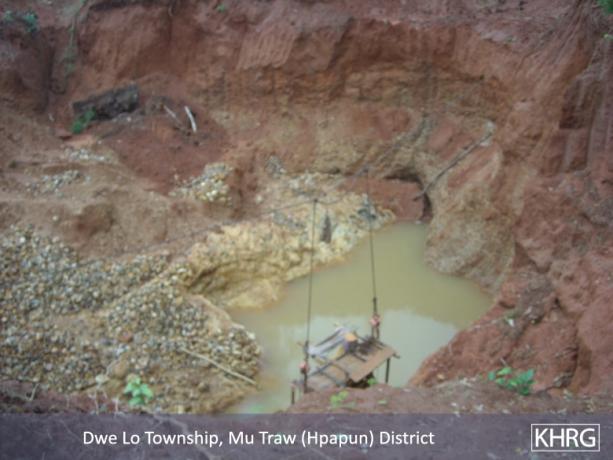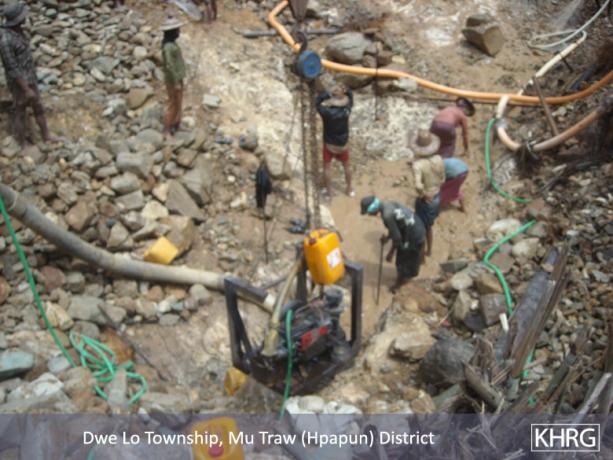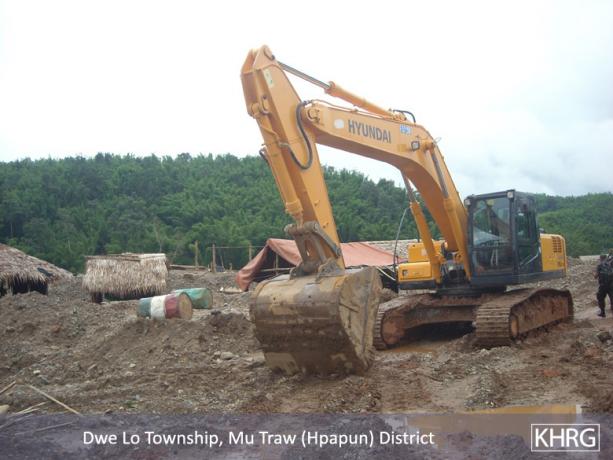This report includes a situation update submitted to KHRG in November 2012 by a community member trained by KHRG to monitor human rights. It describes events occurring in Papun District during the period between July to October 2012. Specifically discussed are Tatmadaw and Border Guard abuses, including forced labour, portering, land confiscation, coercive land sale transactions, and damages to the villagers' livelihood. The community member mentioned that large amounts of the villagers' land were confiscated and damaged, as well as an increase in waterborne diseases, from gold mines that were initially operated by the DKBA, but now villagers are uncertain if the private parties who are negotiating permission to continue from the KNU will be allowed to continue the mines. This report also describes how Border Guard #1013 confiscated more than 75 acres of plantation land in order to build shelters for soldiers' families, which created direct problems for villagers livelihoods. Tatmadaw Infantry Battalion #96 has been forcing villagers to perform various work for the base and for soldiers on patrol, and demanded bamboo poles to repair their camp. Moe Win, a company second-in-command from Tatmadaw Light Infantry Division #44, sexually abused Naw C---, a married woman from T--- village, in her home while she, her baby, and her husband was sleeping. The Company Commander promised Naw C--- 200,000 kyat as compensation and to ensure she not report the crime, but only 100,000 kyat has been paid. This report, and others, will be published in March 2013 as part of KHRG's thematic report: Losing Ground: Land conflicts and collective action in eastern Myanmar.
Situation Update | Dwe Lo Township, Papun District (July to October 2012)
The following situation update was written by a community member in Papun District who has been trained by KHRG to monitor human rights conditions. It is presented below translated exactly as originally written, save for minor edits for clarity and security.[1] This report was received along with other information from Papun District, including two incident reports, three interviews, one other situation update, 240 photographs.[2]
Introduction
I am submitting this situation report and I included [information on] the human rights abuses that happened between July 1st 2012 and October 15th 2012. It includes [information on] forced labour that has taken place since the ceasefire.[3] The Tatmadaw has been active in our area and has ordered the villagers for set tha.[4] They have also ordered one or two boats everyday from the villagers who own boats.
Moreover, a Tatmadaw [soldier] who lives in our area also raped a girl. There are also problems from gold mining, which has destroyed the villagers' lands, and the villagers always have to face many different kinds of problems. Likewise, the Border Guard[5] confiscated the villagers' land in order to build shelters for their families.
Confiscation
In our area, between 2009 to 2012, the villagers' lands and plantations were destroyed because of wealthy people from companies, [who] came and mined for gold. Because of gold mining, the river became murky. The villagers who drink water from the Bu Loh loh [river], get murky water, so there are many diseases [that have] increased. Moreover, the animals, such as cows and buffalo, drank the water from the river and got diseases. Likewise, the fish in the river have also died.
When I went and met with H---'s Tatmadaw village head, Mu Gah[6] Naw W--- said, "Being a human in this area, we have to be afraid of everything. If the Tatmadaw comes, we have to be afraid of them. If the Border Guard (BGF) or the Democratic Karen Benevolent Army (DKBA)[7] come, we also need to be afraid of them. We also have to be afraid of Karen National Union (KNU) leaders. We don't dare and report to [any of] them the problems that the public are facing now, and if we dare, we worry that we would be fined. If we think carefully, being public doesn't have any value".
Regarding gold mining, the DKBA came since 2009 to mine gold. Because of that, the villagers' properties were destroyed. The villagers faced so many problems, and when the DKBA left, there was not any gold mining and the villagers were very happy. But, again, the rich people came and asked permission [to mine] from [KNU] headquarters, and district and township leaders. They were permitted [to mine], so the company came to mine more gold than the DKBA did. The DKBA mined gold in three rivers, such as Meh Kleh kloh, Baw Paw kloh and Meh Kleh kloh, so the plantations, other properties and trees beside the rivers were all destroyed.
Between June 2012 to August 2012, I heard that the KNU leaders would stop the gold mining project, and I was so happy. If we look today, the company in charge [of the mines] came and built their relationship with the KNU leader and later claimed that they were given permission from [KNU] headquarters, but they started making preparations, which makes me worry again. Since the gold mining project started, there have always been problems. If there is still the gold mining in the future, our children will also face the same problems as us.
Regarding the gold mining, if the leaders see that there are benefits for the villagers, they should not stop the company. If the leaders from other countries see that there are no benefits for the villagers, I hope they would delay it until it can be completely stopped. Since gold started being mined, there have not been any benefits for the villagers. Instead, it has destroyed huge amounts of the villagers' lands, plantations, trees and bamboo. There is only plain land without any green grass, just like what [happened to the land], as Muh Gah Naw W--- mentioned above. Now, the leaders stopped the gold mining, so there is no more gold mining and the villagers are very happy about it. However, the villagers recently started to worry again because so many companies and rich people came. If the leaders allow them [to mine], the villagers will face the same problems as in the past again.
After the ceasefire talk, on June 5th 2012, in our area, the Tatmadaw Light Infantry Division #44, Tactical Operations Command (TOC) #442's Commander, Tin Htun, appointed Border Guard Battalion number #1013's Commander, Hla Kyaing, and Deputy Battalion Commander, Tin Win, to come and build shelters for the families of the soldiers between Sa--- and S---. [This is] a place called Wah Hker Toh area, [which is] 75 acres large and the construction will destroy rubber plantations, flat fields, a graveyard, and football fields.
The villagers whose properties will be destroyed when the BGF [Border Guard] builds their families' shelters are: (1) P--'s 20-acre rubber plantation on four acres of flat field; (2) Saw M---'s one-acre rubber plantation on ten acres of flat field; (3) Gy---'s one acre of flat field; and (4) Saw L---'s three-acre rubber plantation. All of these villagers live in S--- village. The villagers from Sa--- also lost properties such as: (1) three acres of flat field; (2) two acres of rubber plantation; (3) Ma Hs---'s nine acres of rubber plantation; and (4) two acres of cardamom plantation. Some of the villagers from Htee Hsaw Meh also lost their land.
Before they started building, Commander Tin Htun and Commander Hla Kyaing gathered the owners of the plantations fields and flat fields, and informed them that there will be shelters on their lands and that they would have to sell their lands to them [the Tatmadaw and Border Guard]. The owners would have to accept and be satisfied with how much they will pay. If not, they will just confiscate the lands without paying. Because of that, the villagers were afraid and sold their land for 450,000 kyat (US $528.17)[8] for one acre of land, but rubber plantations were [sold for] 800,000 kyat (US $938.97) for one acre. Some villagers got paid for each tree in the rubber plantation; for example, one rubber tree was 5,000 kyat (US $5.87). The villagers who have suffered for this case said that, "Because we were threatened, we sold it to them. We know that the money that we got paid won't last for very long, but if we have a flat field or a rubber plantation, it will last until our children and our grandchildren [can work]. Now, they are still building; they didn't stop building, even though the KNLA[Karen National Liberation Army] stopped them." Thara [Teacher] Aung Gyi said that after Commander Tin Htun met with the villagers, they told the villagers not to spread [information about] the project to KNU leaders or the leaders from other countries.[9]
Forced labour and demands
There is always forced labour and demands in our area when the Tatmadaw is active. But it is not happening very often, like in the previous years. It has become a lot less.
For example, the Tatmadaw army camp in R--- is occupied by Infantry Battalion [IB] #96 and led by Company Commander Myo Ko, who ordered R--- villagers to serve as set tha [messengers]; one person [served] per day. Every day, each villager who has to serve as set tha [must] go around and send letters, cook for them, cut bamboo and trees and also build fencing for their army camp. This kind of forced labour still happens even now.
Moreover, they also based a column [in R--- village], and there are 24 soldiers in that column. The column is active in B---, D--- and R---. The column is Light Infantry Battalion [LID] #44, [Column] #9, [led by] Column Commander Mya Min Thu. Whenever they travel, they always call two porters from the villagers to carry their stuff and travel in front of them. If they arrive in a village, they will call porters from the new village and let the old porters go back to their village. There are still demands from them as well as forced labour. However, it is becoming a little less; there is no more killing or torture.
The Tatmadaw, based in G--- army camp, is IB #[96], [led by] Camp Commander Myo Min Tun, and the company second-in-command is Nyi Nyi Htway. On July 18th 2012, they demanded the villagers cut 80 Wah Thoh[10] and 20 poles of Wah Kluh,[11] in order to repair their camp.
On July 20th 2012, Commander Myo Min Tun ordered two boats per day from the villagers who own boats. They ordered them to go and wait in front of their army camp, which is by the river, and asked them to transport food. It is still happening even now. When they [IB #96] ordered them to do something, they said they would pay, but they did not pay anything, even now. Sometimes, they even order the villagers to carry the toilet bowl for them to build a toilet to "pee and shit"; they ordered the villagers to carry that.
Starting on July 4th 2012 until now, their [IB #96's] demands are increasing. On August 23rd 2012, they again ordered G--- villagers to cut three poles of Wah Kluh and 10 poles of Wah May[12] to repair their army camp.
In order to prove that the abuses that G---villagers have suffered are true, the G--- section leader, U Wa---, sent out his note as a proof.
Rape case
The Tatmadaw soldiers LID [Battalion] #44, [Column] #3 is led by the company's second-in-command, Moe Win. There are 27 soldiers in that column and they are active in D---, K--- and G--- [villages].
On June 15th 2012, this column came from D---village, entered T--- village and spent their nights there. On June 16th 2012, in the night time at 11:00pm, most of the villagers were asleep. At that time, the company's second-in-command, Moe Win, went to a villager named Naw C---'s house, and went inside her bedroom. Without saying anything, he lifted up Naw C---'s sarong. At that time, Naw C--- was about to move and her child cried, so her husband who slept in front [room] of the house was awakened and called his wife to ask why she did not hear her child crying. When Moe Win heard her husband's voice, he tried to run. At that time, Naw C--- shouted that someone was in her room, so her husband went inside the room and saw Moe Win sitting by the fireplace. When C---'s husband went to check his wife, Moe Win ran away from the house. In the morning, C---'s husband went to see Commander Soe Wunna and reported it to him. Commander Soe Wunna told him not to spread [word of] the incident; [Soe Wunna] would compensate them with 200,000 kyat (US $234.74). No one spread [information of] the incident. Until now he [Soe Wunna] only paid 100,000 kyat (US $117.37), the other 100,000 has not been paid yet.
Military activities
The Tatmadaw army who is based in R---, is IB #96 and the camp commander is Myo Ko; he ordered the villagers as set tha and also ordered them to cut trees and bamboo. There is a column called LID #44, [Column] #9 for the R---, B---and D--- [village] area. They always ask the villagers to porter, where two villagers from each village have to go to the frontline.
The army that is based in G--- army camp is IB #96.The Camp Commander Myo Min Htun, and the Company Second-in-command Nyi Nyi Htway, always order the villagers to do something. IB #96's company commander was appointed on August 8th 2012, and the IB #96 camp commander was appointed on August 6th 2012; they always rotate after serving for four months.
The Tatmadaw army who is active in the eastern part of Bu Loh kloh, which includes D---, Pr---, T--- and K---, is LID #44, [Column] #3; Camp Commander Soe Wunna leads them, and there are 27 soldiers. They always order the villagers to porter and guide them when they arrive in each village.
For Sa--- army camp, LID #44's TOC #442, led by Commander Tin Htun, is based there. For the other places, I do not know which group of army is active.
Conclusion
The above abuses that I have written [about] in this report are the human rights abuses that happened in our Dwe Lo Township. I documented the information and the photos, when I was travelling to collect the information. It is a truthful story. The villagers from Sa--- village tract, such as S---, Hk---, Sa--- and Ta---have to face problems from Border Guard Battalion #1013. Major Hla Kyaing is going to build shelters for soldiers' families, and in order to do that, they confiscated the villagers' rubber plantations and many flat fields, so it becomes problematic for them to do their livelihoods.
For the western part of Bu Loh Traw, the rich people from a company came and mined gold, so the villagers who live near there face damages to the soil, plantations and they have to drink polluted water. So, the best thing is to stop mining gold. Forced labour, force portering, looting, set tha, demands and rape still happen, even now.
These photos were taken on July 4th 2012in Dweh Loh Township, Papun district, and show land that was damaged because of gold mining conducted by the Ko Cho and Htee Phyu Sin companies. According to the community member who took these photos, the river in the area was contaminated by the gold mining process and, because of that, the people and animals reliant on this water began to develop illnesses after drinking it
These photos were taken on July 4th 2012 in Mah Lay Ler village tract, Dweh Loh Township, Papun District. The top left photo shows damage to villagers’ houses, while the top right and bottom photos show excavation pits and environmental contamination caused by this gold mine. As can be seen, the damage is not only limited to the mine site, but includes the area through which vehicles pass to and from the site. The community member who took these photos explained that mines such as these have damaged villagers’ livelihoods.
These photos were taken on July 15th 2012 in Dweh Loh Township, Papun district. The top left photo shows mine workers as they mine the gold using a water pump and what appears to be a liquid additive contained in yellow plastic containers, which may be petrol for the pump. The top right photo shows a backhoe that is used for excavating large amounts of soil from an area. Finally, the photo on the bottom shows shelters for the mine workers who live near the mine.
Footnotes:
[1] KHRG trains community members in eastern Burma to document individual human rights abuses using a standardised reporting format; conduct interviews with other villagers; and write general updates on the situation in areas with which they are familiar. When writing situation updates, community members are encouraged to summarise recent events, raise issues that they consider to be important, and present their opinions or perspective on abuse and other local dynamics in their area.
[2] In order to increase the transparency of KHRG methodology and more directly communicate the experiences and perspectives of villagers in eastern Burma, KHRG aims to make all field information received available on the KHRG website once it has been processed and translated, subject only to security considerations. As companion to this, a redesigned website will be released in 2012. In the meantime, KHRG's most recently-published field information from Papun District can be found in the report, "Papun Situation Update: Lu Thaw Township, March to November 2012," KHRG, February 2013.
[3] For additional information and analysis on the ceasefire between the Burma government and the KNU, see "Steps towards peace: Local participation in the Karen ceasefire process," KHRG, November 2012.
[4] Set tha is a Burmese term for forced labour duty as a messenger stationed at army camps or bases and serving as a go-between to deliver orders from army officers to village heads, but also involving other menial tasks when no messages are in need of delivery.
[5] Border Guard battalions of the Tatmadaw were established in 2010, and they are composed mostly of soldiers from former non-state armed groups, such as older constellations of the DKBA, which have formalized ceasefire agreements with the Burmese government and agreed to transform into battalions within the Tatmadaw. Border Guard battalions are assigned four digit battalion numbers, whereas regular Tatmadaw infantry or light infantry battalions are identified by two or three digit battalion numbers. For more information, see "DKBA officially becomes Border Guard Force," Democratic Voice of Burma, August 2010, and, "Exploitation and recruitment under the DKBA in Pa'an District," KHRG, June 2009.
[6] Muh Gah literally means "aunt" but it is also a prefix to address someone who is the about the same age with your parents or aunt.
[7] The DKBA was formed in December 1994, led by monk U Thuzana with the help and support of the State Law and Order Restoration Council (SLORC), which was the name of the military government in Burma at that time. For more information on the formation of the DKBA, see "Inside the DKBA," KHRG, 1996.
[8] As of November 27th, 2012, all conversion estimates for the kyat in this report are based on the official market rate of 852 kyat to the US $1. This reflects new measures taken by Burma's central bank on April 2nd 2012 to initiate a managed float of the kyat, thus replacing the previous fixed rate of 6.5 kyat to US $1.
[9] The community member is likely referring to members of the Norwegian Myanmar Peace Support Initiative (MSPI) who have been actively visiting rural areas in Karen state to meet with local communities. For more information on the MPSI pilot projects, see "Nyaunglebin Situation Update: KyaukKyi Township, July 2012," KHRG September 2012; see also "Situation Update: Moo, Ler Doh and Hsaw Htee townships, Nyaunglebin District (January to June 2012)," KHRG October 2012.
[10] Wah Thoh is "giant" bamboo that has a diameter of around 8 inches, with narrow leaves that are less than an inch wide.
[11] Wah kluh is "giant" bamboo that has a diameter of around 8 inches, with broad leaves that are around 4 inches wide.
[12] Wah May is a narrow kind of bamboo that has a diameter of around three inches.



